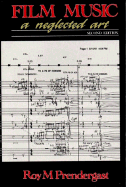Film Music: A Neglected Art (review)

My first intention was to buy the most recent books on film scoring so I would get more information of the genre as a whole, but it turns out I was going at it the wrong way. The earlier film books (during the time when the art itself wasn’t as popular as it is now) will concentrate on scores made in the 1940s and 50s, which is an excellent time to study. Recent film score books are good, but will take a lot more time to understand because of the expansion of technology beginning in the early 80s. These early books, such as Film Music: A Neglected Art (written by Roy M. Prendergast) are a great gift to present film composers.
Because this book was published in 1977, the door of the room filled with rapid synthesizer technology, huge-budget special effects films, and John Williams is immediately slammed shut on us. And trust me, it feels ever so peaceful. It’s like taking a drive out of the fast city and stopping by in a town filled with priceless memories. I’ve never read a film music book that really highlights the growth of scoring from the 30s-50s. This was the sparkling age of film scores. You had the really cool guys like Franz Waxman, Bernard Herrmann, Elmer Bernstein, Miklos Rozsa, and David Raksin... to name a few.
I don’t want to go too deep into what the book gives you, but I’ll point out a few things that caught my interest. The book not only strikes key significances in film music, but also in the entire film industry... its highs and lows and its struggle with television's rising popularity. One chapter briefly mentions the effectiveness of Wagner’s leitmotif (from Ring des Nibelungen), which is still constantly used in film music today. One other fact I found very interesting was the ‘trade’ of prestigious composers (such as Arnold Schoenberg and Igor Stravinsky) for more advanced American recording equipment.
The book is filled with excerpts from scores such as Laura, Psycho, The Best Years of Our Lives, The Heiress, and The Man with the Golden Arm. Some scans are easier to follow, but others are a bit... scribbly, heh. Still, better scribbles than Beethoven’s rough work... oh man.
I really enjoyed the chapter regarding music in animated film and cartoons. It deals a lot with Chuck Jones’ approach to music on paper, the relation between cartoon music and opera buffa (18th-century opera), and the goods delivered by Scott Bradley. I’ll go into more depth on this chapter in my next post (with scans and clips) because I like making musical comparisons, and this particular topic (cartoon animation) astounds me the most.
I’m telling you, this book took my new-found love for classical film scores to a whole new level. I learned a lot of nifty stuff, and am recommending it to those who are interested in that particular period as well. I put an amazon link below; it’s at an extremely sweet price. Buy it and learn about the REALLY good stuff!
http://www.amazon.com/Film-Music-Neglected-Critical-Films/dp/039330874X
